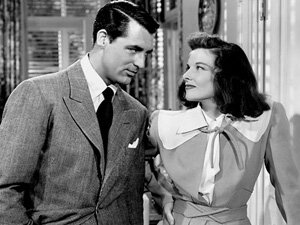Directed by George Cukor
I’ve been doing a bit of “re-watching” of some all-time favourites, such as The Philadelphia Story, which I ran in the DVD player last night. I’ve lost track of how many times I’ve seen this movie.
In re-watching films like this I usually find, as with The Philadelphia Story, that during the first few minutes, as great as they are, I have a sense of, “Gee, I’ve seen this so many times; do I really want to see it again?” Yet in a very short time I’m into the film’s stream and fully engaged as if I’m seeing it for the first time.
Actually, this is something of a problem. Studying, reviewing, critiquing bad movies is relatively easy because you aren’t very involved with the film. You can step back and see it objectively – or hopefully you can.
But with a really good film, it’s sometimes difficult to identify why it is so good because, at least in part, it engages you so fully you forget you are watching a movie and, being caught up in the film’s story, you neglect to note some of the technical aspects of the story-telling, such as structure.

For me, this is certainly the case with The Philadelphia Story. Moments after it starts I’m into the film and, no matter how strong my intent was to view it from a technical perspective, I can’t. I’m too busy enjoying it.
I can, however, make a few guesses as to why this movie works so well. There are, of course, the performances.
While we all note how good Cary Grant, Katherine Hepburn and Jimmy Stewart are, and how well they work as an ensemble, it goes well beyond that to the greater ensemble.
By this I mean the many wonderful supporting performances – one of the keys to many of the great old Hollywood films and a definite key here.
Another reason it works so well is because the various “acts” of the film fit so well together. You often hear of some films, “It was great till the third act, then it just turned into a car chase,” or “It was okay but the second act dragged.” In the case of The Philadelphia Story, there is a wonderful balance between the acts (perhaps because it began as a play). In fact, it’s difficult to say where the transitions are because everything seems to unfold so naturally. The movie feels seamless.
It also seems to me that another reason the film works brilliantly is because it is so well focused on its essential theme which, I think, is articulated first by Cary Grant as C. K. Dexter Haven (and later repeated by Hepburn’s Tracy Lord):
“… You’ll never be a first-class human being or a first-class woman until you’ve learned to have regard for human frailty.”
This is focused in Tracy, who is contemptuous of her ex-husband (Grant) and her father (John Halliday as Seth Lord).
The film is all about “human frailty” … it’s a kind of celebration of it, and it’s reflected everywhere in the movie. (Such as Ruth Hussey as Liz when, questioned by Grant, she refers to Jimmy Stewart’s character Macaulay Connor and suggests that, yes, she’s in love with him but is willing to wait for him to … well, grow up is essentially what she means.)
It all reminds me of a line at the end of Mark Helprin’s novel Memoir from Antproof Case, which goes:
“Though the world is constructed to serve glory, success, and strength, one love’s ones parents and one’s children despite their failings and weaknesses – sometimes even more on account of them.”
I’m surprised I’ve managed to write as much as I have about the movie. I had been scratching my noggin to think of what to say other than, “I really, really like it!” But I suppose I’ve discovered at least three of the reasons why it works so well for me: focus, balance and performance.
And of course, it’s theme of human failings goes over big with me.
To me, this is a perfect diamond of a film. It’s easily one of the best romantic comedies ever made.
Side notes:
There are interesting side notes about The Philadelphia Story, referred to in Marc Eliot’s biography Jimmy Stewart and elsewhere.
For instance … Jimmy Stewart, who won the Best Actor award at the Academy Awards for his role as Macaulay Connor, was not the first choice for the role. Katharine Hepburn (among others) suggested Clark Gable and Spencer Tracy.
(Hepburn basically owned the rights to the script through her relationship with Howard Hughes.)
Both actors were offered the role and both turned it down, possibly because Hepburn (for whom the movie was meant to be a reviving vehicle) was “box-office poison” following the disappointment of Bringing Up Baby and that movie’s lack of success.
Gable may have had other reasons. The Philadelphia Story was to be directed by a gay George Cukor and Gable was famously homophobic.
(According to Eliot, Cukor was on board to also direct Gone With the Wind but was fired at Gable’s insistence.)
As for Cary Grant, he initially wanted the role of Macaulay Connor but was talked into taking the role of C.K. Dexter Haven by Katharine Hepburn. (He did, however, get top billing and a very high salary for that time in Hollywood (which he had donated to the British War Relief Fund).
So Jimmy Stewart ended up in the role that won him an Academy Award. Many, including Stewart himself, believe the award had as much to do with his performance in Mr. Smith Goes to Washington, for which he did not receive the best actor Oscar (despite expectations that he would). Stewart, and others, felt the award was about setting things straight.
Stars: 4 out of 4.
(Originally written & posted August 6, 2006 – updated July 28, 2009.)



5 Responses